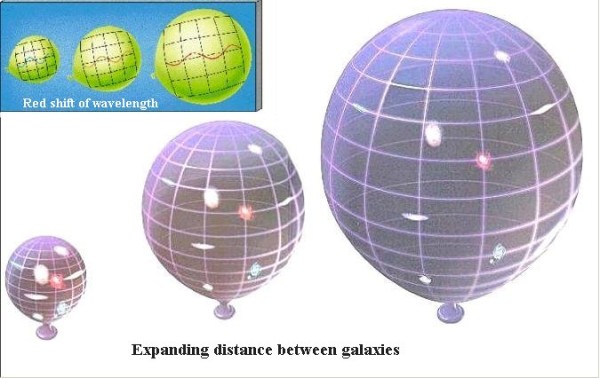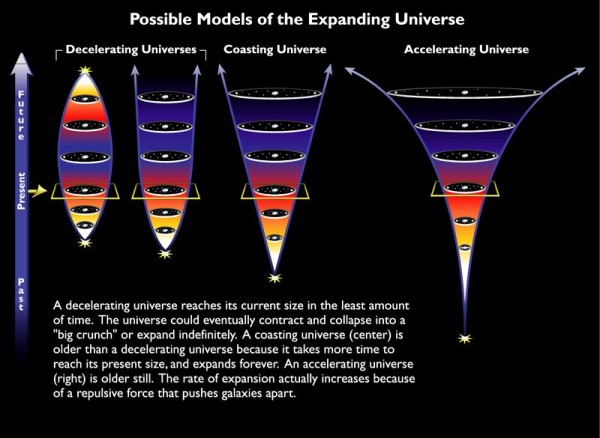“The mind, once expanded to the dimensions of larger ideas, never returns to its original size.” -Oliver Wendell Holmes
But it isn't just your mind that expands as time goes on and you increase your knowledge, but the entire Universe as well. General Relativity, as it turns out, doesn't leave us with much of a choice. If you start with a Universe full of matter and radiation, it's got to expand, otherwise it will collapse in on itself!
But this expansion has consequences of its own, including the surprising fact that there's not only a finite amount of the Universe that's presently visible to us, but that the size of the Universe that we can presently observe is significantly larger than what you'd expect from a static spacetime!
- Log in to post comments
More like this
"The mind, once expanded to the dimensions of larger ideas, never returns to its original size." -Oliver Wendell Holmes
When General Relativity supplanted Newton's work as our theory of how gravity works in the Universe, it didn't just change how we view how masses attract, it gave us a new…
“I want to stand as close to the edge as I can without going over. Out on the edge you see all the kinds of things you can’t see from the center.” -Kurt Vonnegut
The Universe is expanding and cooling, with all but a few of the closest galaxies receding from our view. In fact, the farther away an…
"It's everywhere, really. It's between the galaxies. It is in this room. We believe that everywhere that you have space, empty space, that you cannot avoid having some of this dark energy." -Adam Riess
Have you heard about the accelerating Universe? What about dark energy, vacuum energy, or a…
"Until the 1990s, there were few reliable observations about movement at the scale of the entire universe, which is the only scale dark energy effects. So dark energy could not be seen until we could measure things very, very far away." -Adam Riess
Just thirty years ago, scientists argued over the…







So this 46 billion LY, in terms of what we can observe is what?
The first stars, and the regions from which their light is just reaching us is now $^BLyr away? Or is it the area of space from which CMB radiation emerged is now 46BLy away? Or (assuming we can actually see stuff like B-modes), the space-time from which these were emitted is now 46BLyr away?
Another more interesting question, but I suspect unanswerable one, is now much larger is the entire creation of the BBuniverse compared to the part we can see?
@Omega Centauri #1: Of the 46 Gly radius, we can observe nearly all of it: the CMB "surface of last scattering" is very close to that boundary (it's closer by 380000/13.67e+9, more or less).
Essentially, that radius corresponds to the tiny region of the Universe that underwent inflation, and then stopped inflating to begin a Hubble's-Law expansion.
Because we have no way of knowing how long inflation lasted before our region turned off (see Ethan's many other posts), it is quite possible that the "rest" of the Universe is effectively infinite in size.
@ Michael,
"Because we have no way of knowing how long inflation lasted..."
Just one addition, not only how long, but also what was the size of the patch. It could have been half the size of proton, but it could have been a light year.
The outcome is the same... beyond our visible, causal horizon, there can be many more of same stuff as here, or can be something different... but if inflation is correct.. it's infinite to the future.
@Omega Centauri: the 46 billion light years is a bit like how far we can see in a fog. We just don't know how big the actual universe is. Some people say "the universe is flat so therefore it's infinite", but IMHO that's a non-sequitur that just doesn't add up. The universe can't grow from a small size to an infinite size in finite time. And I don't see how it could have started out infinite, or how an infinite universe could expand. Note that Ethan hardly mentioned inflation. IMHO it's important to remember it's only a hypothesis that was introduced to "explain" flatness and homogeneity. It's been getting some criticism of late. I think it's superfluous myself, and Big bang cosmology is better off without it. You just start with a "frozen star" early universe instead of a "point singularity".
NB: the Christopher Vitale image is quite nice, but a better depiction would show the grid lines being pushed out.
Actually, it's more like if we limited ourselves to the sound of guns being fired to tell us where everyone is.
If they're driving around really fast, where they *ARE* isn't where the *GUNSHOT* came from, and how far from that point they are depends on how far away they were when they fired off the sound.
It's a lot easier to deal with relativity if you drop the senses of vision and deal with those of sound alone, then put the "in reality" as what you see when you open your eyes. On human scales, light is instant and faster than any movement. Speed of sound much less so.
Maybe someone can answer a question for me.....
If Inflation finished after 10^-32 (roughly) and after 3 year the universe was double the diameter of the milky way, and it is now 46 billion ly......is the universe expanding faster than the speed of light, or am I missing something?
Apologies for the ignorance, this is a difficult subject to get your head around...
@ What
https://www.youtube.com/watch?v=XBr4GkRnY04